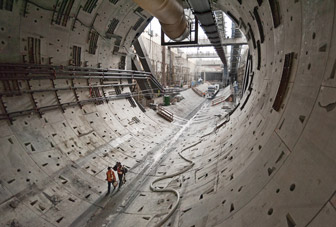
SR99 Tunnel progress in Seattle; image courtesy of Washington State Dept. of Transportation
Bored With Boring?
By Thursday Review staff | published Wednesday, January 1, 2014 |
Drilling, digging, tunneling, puncturing and otherwise boring the Earth has become one of humankind’s great achievements—some might say an obsession. Chunnelling, it is sometimes called, after the great English Channel project connected France with the U.K. Begun in 1987 and 1988 and completed at a cost of almost $10 billion, the Chunnel celebrates its 20th birthday this year.
Where many environmentalists and some geologists worry mightily about the risks to water supplies and the stability of rock and ground underneath (one need look no further than Florida, where over-digging for construction and over-pumping the aquifer to fill the water needs of five states has led to a dangerous outbreak of sinkholes), engineers and developers around the world, on the other hand, see tunnels as a major solution to infrastructure problems and travel limitations. Major cities and crowded residential areas on every continent now have active plans to begin (or complete) major tunnel projects in 2014, and many economists view the massive infrastructure projects as essential to create and maintain tens of thousands of jobs.
Seattle’s “Bertha” project will be completed sometime in 2015 despite recent problems when the giant boring machine met stiff resistance underground. State and Federal engineers hope to have the problem resolved so that Bertha can get back on her forward track. Construction is already taking place underneath some parts of Europe to create a network of below-ground rails connecting many major cities in what may become one of the most expensive projects in European history.
Elsewhere in the U.S. many states and cities are developing plans to build underground aqueducts to transport water from those areas where it is in abundant supply to those areas most in need—cities and suburbs. California has an elaborate plan to construct hundreds of miles of such conduits just to supply water to thirsty Los Angeles and its sprawling suburbs. The rise of powerful bottled water companies has put even more pressure on states and counties, and whole countries, to allow for deeper digging wherever underground sources of water can be tapped.
But despite the concerns of some environmentalists, the great human business of tunneling looks to reach a fevered pace in 2014, with dozens of nations including Japan, Korea, China, Indonesia and several other Asian countries all considering (or starting) major underground transportation projects. And who said engineering was boring?
